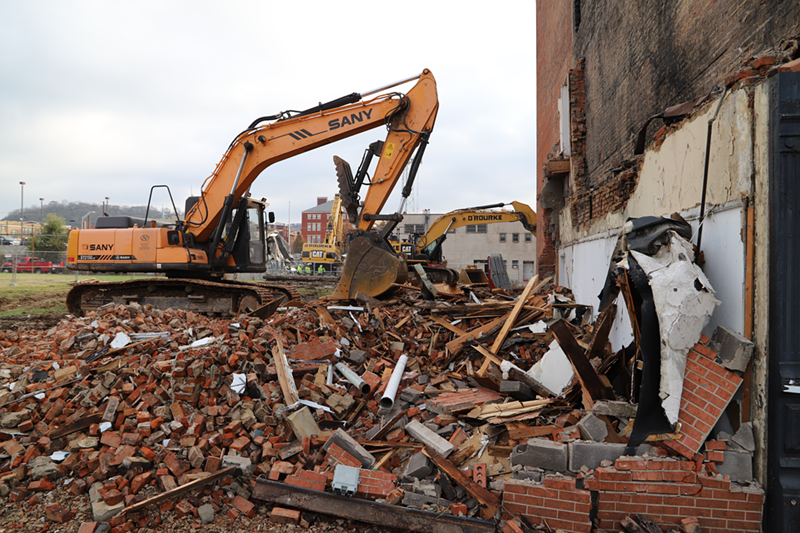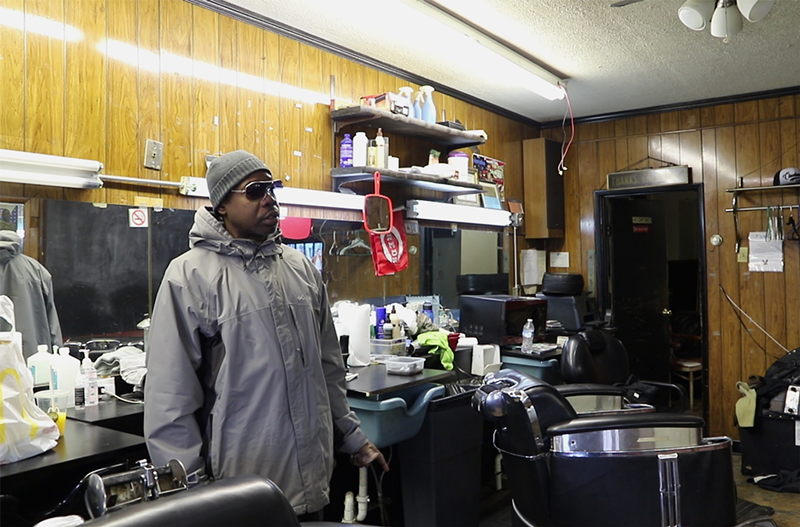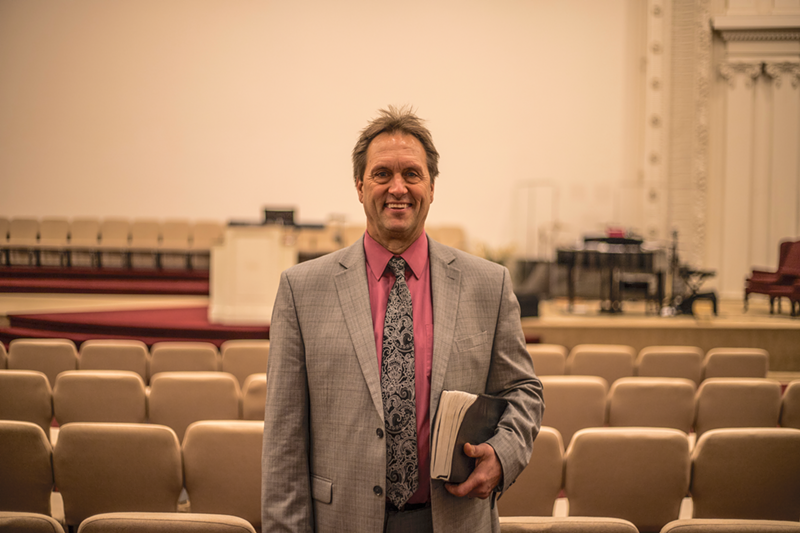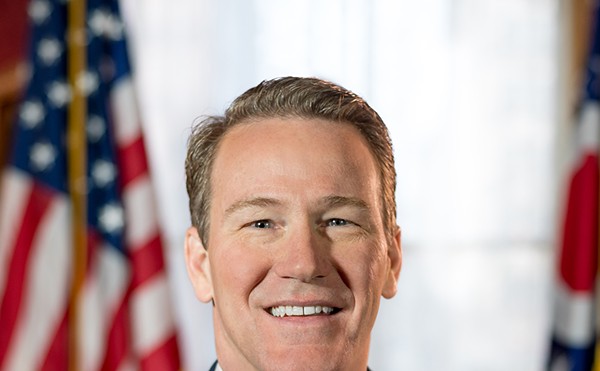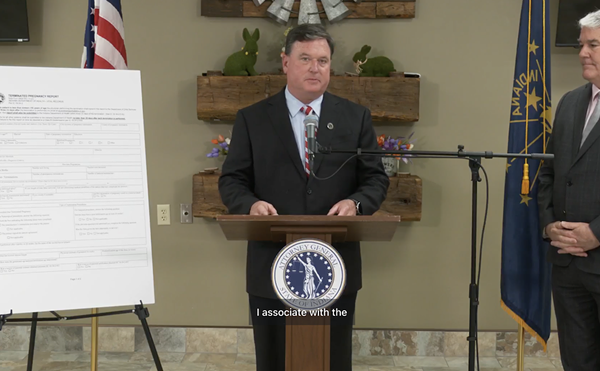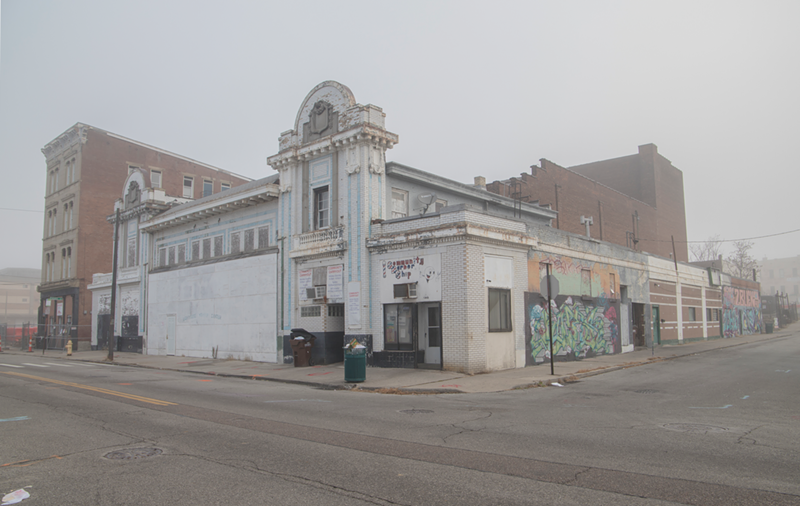
The entrance to Lighthouse Worship Center isn’t much to look at from the outside: Some white wood panels with the church’s name stenciled on them stretch across the face of the graceful pale blue and white State Theater on Central Avenue in Cincinnati’s West End.
But every Sunday morning, the nondescript door in the boarded-up façade is unlocked, and a few dozen congregants, roughly half black and half white, flow into the 103-year-old Beaux Arts building.
Behind that door is another set of doors in a dark, cramped and paint-chipped breezeway that was the theater’s original entrance, leading into a lobby of sorts with freshly-painted walls, new flooring and comfy arm chairs. Beyond that, still more doors lead to a cavernous main room, where the theater’s original ornamentation surrounds a stage and doors to what was once a backstage area but which now houses a children’s area and offices.
When someone opens the door to the outside, you can hear the music played by Lighthouse Pastor Patrick Winkler — who pounds piano keys and sings as often as he delivers sermons — his son Joshua on keyboards and drums, and other members of church staff on various instruments and backup vocals.
The music, and the sermons, have an old school message about God’s love and God’s fire that boils down to this: salvation requires sacrifice.
“God doesn’t want you to be comfortable,” Winkler tells the congregation. “He wants you to be a man or woman of faith.”
The space is austere but clean, with everything from the original ornate designs above the stage to the modern drop ceilings in a white or off white shade, save the wash of burgundy carpet on the theater's stage and the similar warm wine color of some carpeted acoustic panels high up on the wall at the back of the room.
The State Theater, now surrounded by debris from demolition, is among the last structures standing in this slice of the West End that is slated to become FC Cincinnati’s $200 million major league soccer stadium, helped along by $34 million in infrastructure spending from the city of Cincinnati and another $15 million to $22 million from Hamilton County for a parking garage.
The 26,500-seat facility — and the removal of places like the State — signal big changes likely for the historically predominantly black neighborhood with a median household income of just $15,000 a year. FCC and city officials have promised those changes will bring more investment, more jobs, more opportunity. Some residents, however, aren't so sure.
There are reasons for the distrust. The neighborhood and its residents have seen repeated wounds, from the wholesale demolition of the West End's southern half by the city in the early 1960s, displacing as many as 20,000 mostly-black residents, to more recent tearing down of public housing here in the early 2000s. The memories of those experiences linger on.
Positive or negative, all the coming newness means things that have been here for years must go.
A long-running auto garage on the west side of the block is gone, as are some small buildings along Fugate Alley, which runs down the middle of the block. A vacant three-story building with a mural of Fannie and William Mallory Sr., progenitors of a West End black political dynasty that includes former Mayor Mark Mallory and his brother, Cincinnati NAACP Vice President Joe Mallory, has also been demolished. A chunk of Central Avenue is closed to traffic as crews prepare for work relocating utilities buried under the once-bustling thoroughfare.
Across the street, heavy machinery crunches down on the bleachers at Stargel Stadium, a Cincinnati Public Schools facility FC Cincinnati will pay to have rebuilt further south.
Soon, the theater too will be no more, ending the storied structure’s century in the neighborhood.
The theater’s history has seen a number of twists and turns, which have been ably documented by local bloggers and historic preservation advocates. Some colorful highlights: The State, originally built as the Metropolitan Theater in 1915, was at one point co-owned by Alice Roosevelt Longworth, the daughter of Theodore Roosevelt. It was the scene of at least one murder when Charles DiVirgilio shot his ex-wife Josephine in the lobby in 1931.
The theater played a prominent role in hosting the West End’s Jewish community, and starting in the 1940s, when it became the State Theater, its black residents. In that role, it hosted live music by greats like Duke Ellington, and, if a wall with signatures scrawled on it Winkler found in the building is any indication, Smokey Robinson.
The last iteration of the theater closed in 1989, and Winkler bought it with a partner in 1990 after feeling called from his role as a youth pastor in Northern Kentucky to an urban ministry. The first Lighthouse service was Aug. 5, 1990.
The coming demolition has caused mixed feelings — to say the least — among the people who have lived here, worshiped here and done business here.
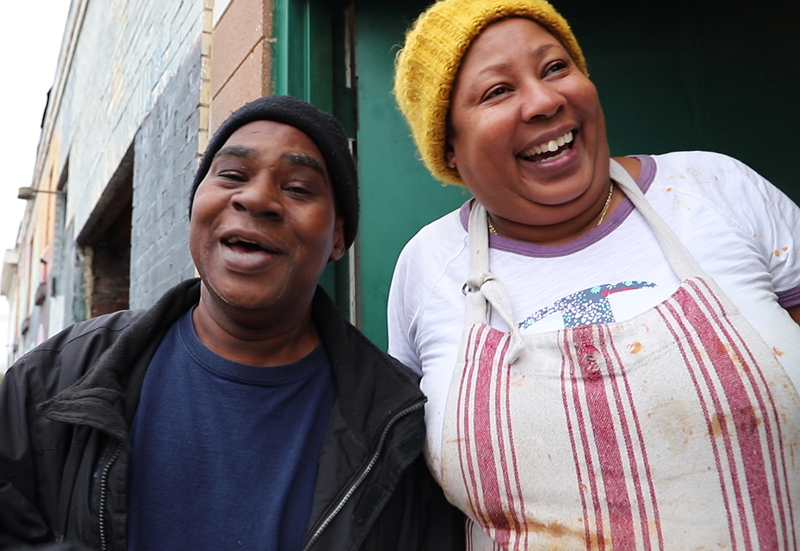
The building’s south side was, until very recently, home to three businesses, including a soul food take-out restaurant called Just Cookin’ run by Monica Williams, Community Barber Shop run by Jason Briers and his father before him, and a convenience store run by Briers’ brother.
Williams’ restaurant held its last day on a recent Friday. The atmosphere was festive, but sad, too — the end of an era for the restaurant’s customers and for Williams, as well as for her mother, father, grandmother, nephew and niece, all of whom worked at Just Cookin’.
“It means a lot,” Williams’ nephew Andre Watson says of the restaurant. “Black family owned — we do our thing here. We cook, we have fun, we laugh together, we cry together. Sometimes we argue together. I hope we can stay downtown in this area. We’re from here. We have the community with us. It’s not just about the family. It’s about the support we have. “
Drivers sidle up along West 15th Street to make a final run at fan favorites like cube steak, fried chicken and Williams’ famous mac and cheese.
Daryl Owens has been coming to Just Cookin’ for years.
“It ain’t bragging if you can do it. She’s doing it," he says. "Look at these cars. That’s Just Cookin’."
He points out a friend walking out with a stack of Styrofoam containers.
“He’s got two dinners! There isn’t another restaurant in this city like this. This is just the real thing.”
Gail Benton grew up in Lincoln Court nearby, but moved away in her teens. She speaks carefully, but openly, about the hurt she feels seeing Just Cookin’ close as the predominantly black West End faces big potential shifts ahead.
“I still come down here because I patronize this young lady who I used to rock on my lap,” she says of Williams, who also grew up in Lincoln Court before the housing project was torn down in the early 2000s as part of a HUD program called Hope VI.
“It has changed tremendously,” Benton says of the West End. “I think it’s sad, if I can say that. They tore down the projects that I grew up in. A lot of people can’t afford to live down here now. It has been a transition. It’s better maybe for people who aren’t of my descent. That’s just the way it is.”
For Benton, Just Cookin’ is one of the last ties to the West End she remembers.
“The food is cooked with love,” she says. “It’s an extension of the roots we come from. This is how we cook as African-Americans.”
That correlation between food, culture and family is one Williams subscribes to whole-heartedly.
“Authentic soul food started in our grandparents’ homes,” she says. “It was the staple that held the family together. The glue. And we’re losing that. We’re losing our way of cooking in our community.”
Williams hasn’t taken the closing sitting down. She’s been vocal about her anger at having to move, and about the fact she feels she hasn’t been given adequate support to find another location, though she also says she hasn’t given up hope.
In the tiny, closet-sized office off Just Cookin’s kitchen, she thumbs through estimates for the build-out at a new, larger space nearby on Linn Street, with diagrams and lines of numbers adding up to well more than 10 times the money she received from the FC Cincinnati for her space. She’s gotten some help from minority business incubator MORTAR, Seven Hills Neighborhood Houses, a West End institution that provides a number of services for residents, and from some members of Cincinnati’s development community.
But certainty has yet to materialize in the days following the restaurant’s closing.
Williams says that originally, she was “all for the change” that could come with the stadium but now feels “sold out.” She says she’ll need more resources to make the leap. And she’s worried.
“Right now, I’m losing my business,” she says. “I have not gotten any resources from the city. For six years, I ran my own business with my own money. I never asked for a loan. I never asked for a grant.”
Around the corner, Briers stands in his barbershop, unsure about his next moves as he faces leaving the shop and his apartment upstairs. He may have found a new living space in Covington, he says, and possibly a new storefront in Avondale. Both, however, need work, and it’s unclear when he would be able to move into either. Like Williams, he says the money he got from FC Cincinnati alone won't be enough to relocate.
The arrangement would stretch Briers’ now-compact life — living above his business and walking two blocks to school at Chatfield College across Central Parkway in Over-the-Rhine — into a series of longer commutes. It would also mean leaving behind the neighborhood where his father first started cutting hair in 1960.
“I feel the same as I have since this started,” Briers says. “I’m being displaced.”
For his part, Winkler says he would help his tenants move if he could. But he says there is no money being exchanged between the church and FC Cincinnati for the property. He’s careful about what he will reveal about the deal — which is not expected to be finalized until at least Dec. 31, documents FC Cincinnati filed with the Cincinnati Planning Commission show — but it involves the team helping the church find a temporary location and building a new permanent building.
“We’re not getting any cash,” he says. “That’s not the way the contract is written. If I was getting millions, I wouldn’t mind helping relocating people, especially Monica. I wouldn’t care. But even if I was, it wouldn’t be my responsibility. But I don’t have money. I’m an inner-city church. We don’t have thousands of dollars in our operating fund.”
There is a lot of uncertainty around the church’s relocation, according to Winkler. He says he’d like Lighthouse to end up with a new building somewhere in Northern Kentucky where there is need similar to that in the West End — Covington or Latonia, perhaps. The church currently provides a number of services to those around the neighborhood, including bagged lunches, clothing collections and other efforts.
“It’s been a slow journey,” he says. “I feel like we’re an inch past go since it all began. It’s even more complicated on the Kentucky side… It’s just trying to find something. We’ve had a couple things in the making, but there’s a lot of red tape. It’s an ongoing work of progress. But I’ve not had any bad feelings, and everything (the team is) doing, they’ve asked for our permission to do it. Everything has been good. I don’t see it jeopardizing the church.”
Myra Fagin says she will follow the church to its new home, wherever that ends up being. Fagin has been coming to Lighthouse almost since Winkler began the church with a partner in the early 1990s. She was fresh in from Indianapolis, she says, and didn’t know anyone in town. At one point, she lived in a building on McMicken Street the church has offered since 1995 as a transition house to seniors and low-income people.
“They welcomed me in,” she says. “They helped me so much because I was by myself. At first, I didn’t like it because it wasn’t what I was used to — I was used to an all-black church. And the pastor’s white. But I got to know him and thought, this is the place I should be.”
In the nearly three decades the church has been on Central, the building has changed dramatically inside, Fagin says.
“I remember when I first came, when it was the old theater. The seats were rough. It was all rough. It’s totally transformed, looking really good. As you can tell, they’re tearing down the buildings next to the church. Pretty soon it will be us. It’s kind of… I’m glad we’re getting a new church, but… I’m sad we’re leaving. I’ve been here ever since I got to this city. “
While the property is one of the last left to be acquired by FC Cincinnati, there are other points of uncertainty — tussles around parking and other issues between the team and the Cincinnati Ballet, which has its home one block over.
Among the noise of machinery and politics, though, the church will remain for at least a few more services. And even as it comes down in piles of bricks, rebar and metal scraps, this block still wells up with emotion, as it has for more than a century — wistfulness, anger, fear, hope, resilience.
“It’s bittersweet,” Winkler says of leaving. “It’s been a great journey. When we have our last service, I’m sure I’ll feel some of the impact. There’s not a thing in here that I didn’t do to this building. From the shingles and rubber roof to the studs.”
Williams has more immediate concerns.
"I don’t have time to play politics,” she says in her office. “That’s not my job. My job is to continue to cook and open up the doors of Just Cookin’. My customers are going unnoticed. And I feel like the city won’t even address the issue.”

